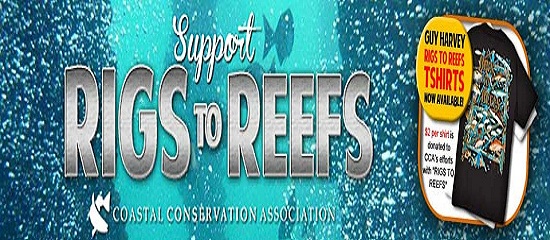CCA applauds Mississippi congressman’s efforts to halt destruction of marine habitat
These Gulf of Mexico platforms you see in this short film will soon be blown out of the water with “shape” charges killing everything on and around them and brought to the scrap yard. This senseless destruction must be stopped…
WASHINGTON, DC – At a breakfast briefing hosted by the Congressional Sportsmen’s Foundation this morning, Rep. Steven Palazzo (R-Miss.) presented the concerns of the recreational angling community over the Department of Interior’s controversial Idle Iron directive and closed by inviting fellow Congressmen to sign onto a letter requesting a moratorium on rig removals.
“A temporary moratorium on rig removals related to the Idle Iron Policy is needed to evaluate those structures and keep as many as safely possible in the water,” he said. “That iron wasn’t put there to become habitat, but that’s what it has become, and it certainly is not ‘idle.’ It is an irreplaceable, living asset that should be protected. And as a sportsman from a Gulf state, I feel an obligation to protect that habitat.”
Coastal Conservation Association worked with Rep. Palazzo on the call for a moratorium on the Idle Iron policy and pledged to engage its membership to encourage their elected officials to add their signatures to the letter.
“Rep. Palazzo clearly appreciates the value of those structures as artificial habitat and understands the concerns of the recreational angling community,” said Pat Murray, CCA president. “His call for a moratorium is the latest in a growing chorus of concerns from other elected officials, marine scientists and other state and federal agencies. It is time for the Department of Interior to heed those concerns and take a more precautionary approach to these structures.”
In a misguided response to the 2010 Gulf oil spill, the U.S. Department of Interior issued the Idle Iron directive in October of 2010 ordering that all non-producing wells be plugged and any associated structures removed within five years of the issuance of that directive. Since then, CCA has worked on and supported a number of actions to derail the Policy, including the Rigs to Reefs Habi
tat Protection Act
filed by U.S. Sen. David Vitter (R-La.) and Rep. Palazzo; language implementing strict review and reporting requirements on removals in the Sportsmen’s Act of 2012; the Gulf of Mexico Fishery Management Council’s decision to begin the process of classifying rigs and other vital artificial reefs as Essential Fish Habitat (EFH), and letters from both Texas Governor Rick Perry and U.S. Rep. Blake Farenthold (R-Texas) to U.S. Department of Interior Secretary Ken Salazar urging him to reconsider the policy.
Earlier this month, a coalition of marine conservation, tackle and boating industry groups also called for a halt to Idle Iron policy in a letter to Secretary Salazar, citing the irreparable damage it stands to inflict on an extensive range of marine fisheries and ecosystems. Additionally, this week the Sportfishing and Boating Partnership Council, an 18-member committee established to provide input to the Department of Interior and the U.S. Fish and Wildlife Service on recreational boating and fishing issues, and aquatic resource conservation issues, sent a letter to Secretary Salazar calling for a two-year moratorium on rig removals.
“These towers of metal covered in coral are inactive for years, sometimes decades. They are a far cry from active rigs engaged in drilling operations in thousands of feet of water,” said Rep. Palazzo. “Rigs and platforms across the Gulf have come and gone over the years, but the Idle Iron Policy proposes to clear-cut that vast forest of structure. The Idle Iron issue may seem complex, but at the end of the day we would be wise to protect these habitats.”
Visit the CCA Rigs to Reefs page to learn more about the issue of these artificial reefs and their impact on the marine environment.
###





